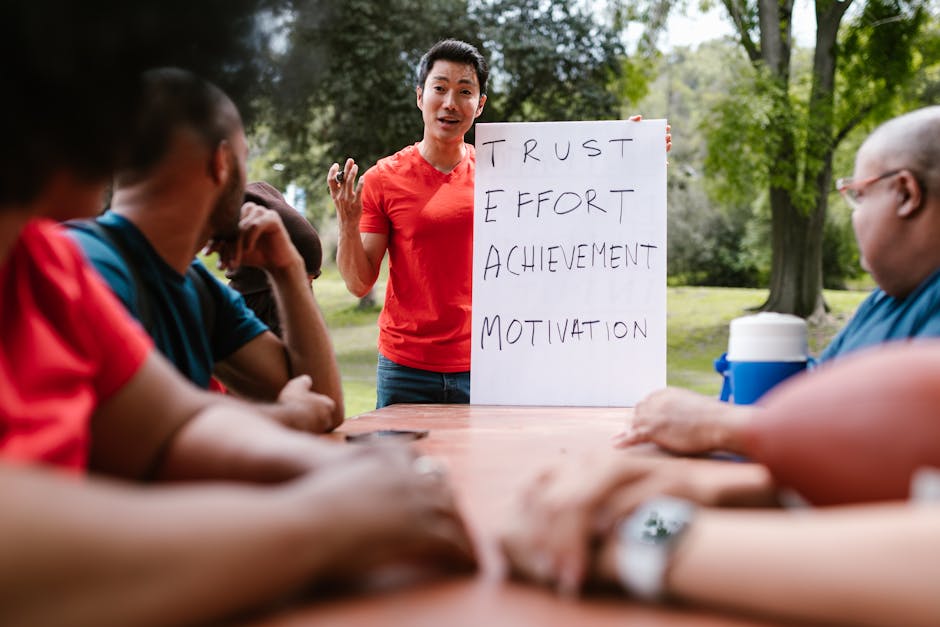Game Theory in Sports: Revolutionizing Coaching and Player Strategy
In a world where sports are becoming more competitive than ever, the integration of game theory into coaching and gameplay offers fresh insights that transform strategic decisions. Whether on the field, court, or pitch, an understanding of competitive dynamics can set teams apart. Utilizing principles from game theory, coaches and players can navigate the complexities of competition, leading to more informed and innovative tactics that revolutionize traditional approaches.
Understanding Game Theory in Sports

Game theory, a mathematical framework for analyzing strategic interactions, enables coaches and players to understand the motives and behaviors of opponents, leading to superior decision-making under pressure. By examining both cooperative and competitive strategies, athletes tap into a wealth of strategic possibilities. An example of this is the successful application of game theory concepts in various sports, such as basketball and football, where predicting rearrangements and play calls can change game outcomes dramatically.
For instance, consider the recent changes in play-calling in the NFL influenced by statistical modelings, like "fourth down conversions," which have shifted the traditional thinking of risk versus reward. Coaches are employing data-driven strategies that take into account opponents' likely responses, fundamentally evolving quarterback decisions. This proactive approach leverages statistics as tactical weapons, rooted in game-theoretic principles.
The Impact of Predictive Analytics on Strategy

Informed decision-making is the heart of successful sports strategies today, and predictive analytics serves as the backbone of many coaching methodologies. Coaches can analyze past performance metrics to predict future outcomes, allowing teams to prepare effectively for opponents. This phenomenon can be exemplified through articles like predictive analytics in sports, which showcases how data analytics not only informs recruitment but also reshapes in-game strategies.
Advanced analytics allows teams to evaluate player movements, effectiveness in specific plays, and even crowd dynamics. Coaches armed with this data can now make decisions not just based on instinct but informed choices driven by statistical evidence. This wide array of data-driven strategies marks a pivotal evolution in coaching and gameplay.
The Evolution of Coaching Techniques

Historically, sports coaching has relied on experience and intuition, but as technology advances, so has the coach’s toolkit. The infusion of game theory encourages experimentation with player dynamics and strategies, and coaches embrace new methodologies. For example, coaches may now implement varied defensive setups based on predictive modeling rather than sticking with traditional approaches.
The modern coach must operate as a strategist, blending psychological insights with statistical analysis. Cognitive coaching is an approach where psychological principles are used alongside game strategies to enhance athlete performance. This intersection of psychology, neuroscience, and sports is redefining how we approach both training regimens and game-day tactics.
Team Dynamics through Game Theory

One of the most profound implications of game theory in sports is its impact on team dynamics. Understanding the motivations and behaviors of teammates—and translating that into cooperative strategies—becomes pivotal. Coaches now focus on creating systems that capitalize on individual strengths while fostering collaboration.
Games like basketball emphasize teamwork, and insights from game theory can help design plays that maximize player efficiency and control. Teams analyze opponents' defensive setups and adjust their strategy in real-time, creating a dynamic and responsive game environment.
The Role of Technology in Strategy Formation

With the unceasing development of technology, sports teams benefit from innovative gadgets that aid strategy formation. Wearable technology and data-gathering software allow teams to analyze performance metrics on the fly. Using these analytics, coaches can formulate real-time strategies that reflect ongoing dynamics.
For instance, virtual reality training has become a compelling tool that prepares athletes for competitive situations by immersing them in realistic gaming environments. This fusion of technology and strategy amplifies our understanding of sports science and drives progress in athlete preparation and performance.
Emphasizing Emotional Intelligence

At the heart of strategic decision-making is the often-overlooked aspect of emotional intelligence (EI). Coaches who can tap into the emotions of their players create an environment where athletes thrive. Emotional awareness can improve teamwork, boost morale, and even inspire confidence during high-pressure circumstances.
Game theory adds another layer to this; it can analyze how interpersonal relationships, motivations, and stress impact strategic decisions. Coaches who emphasize emotional intelligence can navigate the intricacies of athlete performance much more effectively, creating tailored strategies that account for individual emotional landscapes.
Rethinking Fan Engagement: The Role of Strategy

While coaches and players are at the forefront of strategy implementation, fan engagement is an area that can be enhanced through strategic thinking. The modern sports environment demands that teams engage with fans more dynamically, leveraging social media and online interaction to create a narrative around their game's strategy.
The notion of storytelling in sports can be linked to the strategies teams employ. By weaving fan narratives around player dynamics, game strategies, and even rivalries, teams deepen the emotional investments of their supporters. This can railroad into not only increased attendance but also a loyal fanbase that views the team as a multifaceted entity—a community.
Anticipating Opponent Strategies

To maintain a competitive edge, teams must anticipate opponents' strategies as best as possible. Utilizing game theory, coaches employ forecasts based on thorough statistical analysis with the goal of predicting opponent behavior. This foresight allows teams to counteract tactics before they’re even executed on the field.
For coaches, this means extensive pre-game analysis—assessing past game footage, noting tendencies, and even conducting psychological profilers of key players from the opposing team. Resources like AI-based analytics help solve the complexities of these anticipatory strategies, combining raw data with human expertise.
The Future of Game Theory and Sports Dynamics

As game theory continues to evolve, its applications in sports will expand further into the digital realm, enhancing coaching methods and player performance through innovative technological integration. The convergence of AI, predictive analytics, and game analytics positions teams to explore even more robust strategic frameworks.
With the ongoing rise of eSports, the principles of game theory are being adapted anew, creating insights that will further enhance traditional sports organizations. Understanding competitive gaming dynamics can translate into mental frameworks that benefit both players and coaches in conventional sports contexts.
Final Thoughts

In a sports world striving for excellence, the fusion of game theory and strategic decision-making is non-negotiable. Not only does this analytical approach elevate coaching and player strategies, but it also strengthens team dynamics. As we peer into the future, the intertwining of game theory with technology will undoubtedly continue to shape how sports are played, coached, and experienced. Players and coaches are armed with tools that encourage deep understanding of competitor strategy, fostering smarter games and innovative play that will entertain us for years to come.
For anyone invested in sports—be it players, coaches, or fans—the imperative to embrace strategic decision-making rooted in game theory is essential. The changing landscape of how we train, play, and watch invites everyone to engage deeply with the realities of competitive sports.



